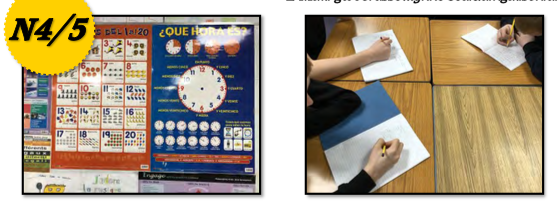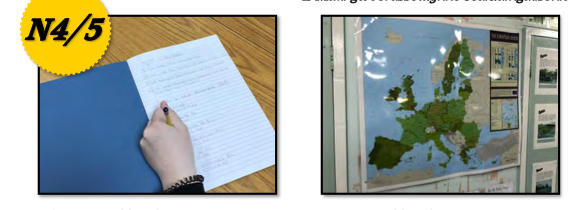French
What will I learn?
Learning a language enables learners to make connections with different people and their cultures, and to play a fuller part as global citizens. The French course enables learners to communicate, be critical thinkers, develop cultural awareness, and be creative. Through the contexts of society, learning, employability and culture learners will have opportunities to extend their skills in applying knowledge of language, planning and research.
The N4 course consists of 3 units:
- Understanding Language – develop reading and listening
- Using Language – develop talking and writing
- Added Value Unit – research a chosen topic in FrenchThe N5 course consists of 2 units:
- Understanding Language – develop reading and listening
- Using Language – develop talking and writing
How will I learn?
Learners will use different media including IT for learning and communication and increasingly develop independent learning. The topics and materials studied come from a variety of sources including French magazines, online articles, songs and websites. There will be a variety of individual, pair and group tasks such as role-plays, dialogues and presentations.
How will I be assessed?
N4 Assessment
All Units are internally assessed, there is no external examination N5 Assessment
Units are externally assessed by the SQA or are controlled assessments in school
-
- SQA exam paper 1 – Reading and Writing (50 marks)
- SQA exam Paper 2 – Listening (20 marks)
- Assignment – Learners will produce a piece of writing (120-200 words) in French (20 marks)
- Performance – talking presentation and conversation with the teacher (30 marks)
Career Opportunities
Languages are highly valued by employers and further and higher education. French is used in many international organisations, such as NATO, the UN, EU institutions, and the World Trade Organisation. It is considered the international language of law and diplomacy. Possible careers include travel and tourism, hospitality, translator/interpreter, law, medicine, finance, engineering, business and enterprise, international organisations, media and broadcasting, marketing and sales, retail, politics, diplomacy, social media, teaching and so on…

German
What will I learn?
Learning a language enables learners to make connections with different people and their cultures, and to play a fuller part as global citizens. The German course enables learners to communicate, be critical thinkers, develop cultural awareness, and be creative. Through the contexts of society, learning, employability and culture learners will have opportunities to extend their skills in applying knowledge of language, planning and research.
The N4 course consists of 3 units:
- Understanding Language – develop reading and listening
- Using Language – develop talking and writing
- Added Value Unit – research a chosen topic inThe N5 course consists of 2 units:
- Understanding Language – develop reading and listening
- Using Language – develop talking and writing
How will I learn?
Learners will use different media including IT for learning and communication and increasingly develop independent learning. The topics and materials studied come from a variety of sources including German magazines, online articles, songs and websites. There will be a variety of individual, pair and group tasks such as role-plays, dialogues and presentations.
How will I be assessed?
N4 Assessment
All Units are internally assessed, there is no external examination N5 Assessment
Units are externally assessed by the SQA or are controlled assessments in school
-
- SQA exam paper 1 – Reading and Writing (50 marks)
- SQA exam Paper 2 – Listening (20 marks)
- Assignment – Learners will produce a piece of writing (120-200 words) in German (20 marks)
- Performance – talking presentation and conversation with the teacher (30 marks)
Career Opportunities
Languages are highly valued by employers and by institutes of further and higher education. The German language is the first language of over 100 million people who primarily live in Germany, Austria and Switzerland. These countries are highly developed and economically strong, which makes them attractive locations for work and living. Possible careers include travel and tourism, hospitality, translator/interpreter, law, medicine, finance, engineering, business and enterprise, international organisations, media and broadcasting, marketing and sales, retail, politics, teaching and so on…


